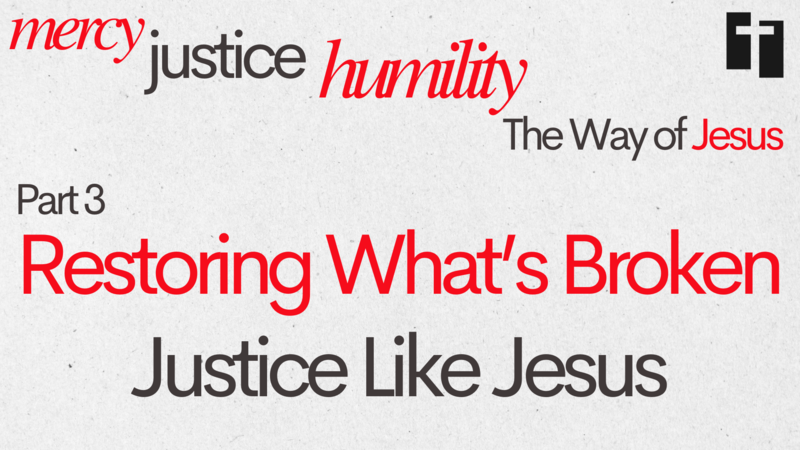
MESSAGE 3: Restoring What’s Broken — Justice Like Jesus
Series Title: Justice. Mercy. Humility. — The Way of Jesus
Theme Verse: Micah 6:8
Primary Text: Luke 4:16–21
Supporting Texts: Isaiah 61:1–3, Matthew 23:23
POINT 1: Jesus Brings Good News to the Poor (Luke 4:18a)
“He has anointed me to preach the gospel to the poor.”
Exposition:
- Poverty in Jesus’ time wasn’t just economic—it meant being socially and spiritually overlooked.
- Jesus announces that the poor matter. Justice begins with recognition and restoration.
Key Insight:
Justice starts where people are hurting most—economically, relationally, spiritually.
Application:
- Who are the overlooked around us? (homeless, single parents, refugees, addicts)
- Do we bring good news, or just good opinions?
POINT 2: Jesus Sets Captives Free (Luke 4:18b)
“He has sent me to proclaim release to the captives and recovery of sight to the blind, to set free those who are oppressed.”
Exposition:
- The phrase “proclaim release” in Greek is aphiēmi (ἀφίημι) — meaning to release, let go, pardon, or forgive.
- It carries both a legal and a spiritual weight — not only freedom from bondage, but from guilt, shame, and condemnation.
- Jesus is declaring not just jailbreaks, but soul-breakthroughs.
- Captivity is more than prison: addiction, trauma, fear, poverty cycles.
- Jesus’ justice liberates. It isn’t content with sympathy—it moves toward freedom.
Cross-Text Tie-In:
- Isaiah 61:1–2 and Matthew 23:23: justice, mercy, and faithfulness are the “weightier matters.”
POINT 3: Jesus Declares the Year of the Lord’s Favor (Luke 4:19)
“To proclaim the favorable year of the Lord.”
Exposition:
- This phrase refers to the Year of Jubilee in Leviticus 25—a time when debts were canceled, slaves were freed, and land was restored.
- Jesus is saying: Now is the time for full restoration. His justice is not delayed—it is present and available through Him.
- This is the culmination of His mission: not just preaching or healing, but ushering in a new way of life.
Key Insight:
The justice of Jesus restores what was lost and releases what was held.
Application:
- Where do you need Jubilee? Where do others around you need it?
- How can you be a vessel of that favor—forgiving, releasing, restoring?
Gospel Tie-In:
- Jesus became poor (2 Cor. 8:9), was falsely accused, unjustly condemned, and crucified outside the city—as one of the marginalized.
- At the cross, Jesus didn’t just restore what was broken—He bore our brokenness.
Key Quote:
“Biblical justice doesn’t ask ‘what do they deserve?’ It asks, ‘what would Jesus do if He stood in front of them?’”
Closing Challenge: Justice Like Jesus
- Jesus came to proclaim good news, to set the oppressed free, and to declare a new day of restoration. That mission didn’t end in Luke 4—it’s continuing through His Church.
Challenge to the Church:
- For every believer: What is Jesus asking of you today?
- Is He asking you to step into someone else’s pain?
- To forgive?
- To serve the poor, the marginalized, the captive?
- To step into a new ministry of justice or healing?
- Don’t let this moment pass.
- Ask Him: “What is my next step in restoring what’s broken?”
Let us not just hear the Word—but walk it out with the same anointing that rested on Jesus.
Declaration:
“I will not pass by the poor, the hurting, the forgotten. I will walk the path of Jesus. I will live justice that restores.”

